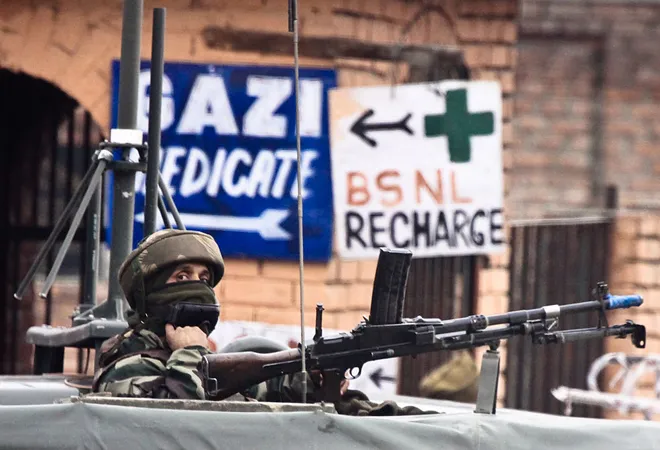By its excesses of display and stimulation, pornography is doomed to failure. Aimed at sexual arousal, it gratifies, but fails to satisfy. That's the way it is, whether it is food porn, with lustrous displays that never quite fulfil, car porn, or travel porn. Those addicted can never have enough, but the end consequences are a constant sense of frustration, akin to neurosis.
There is another dark category that this country is exploring these days — war porn. Hour on hour some TV channels loop clips of jawans charging through the pine studded landscape at the enemy. Rocket and guns are fired at distant targets, all bound together by a narrative suggesting that war is the best way of resolving our problems with Pakistan.
Some of the clips are clearly training videos; no videographer would have had the courage to take the angles presented if live bullets had been flying around. Others are old releases of the army's PR team.
War porn — like the regular thing — gratifies — never satisfies. It indulges the fantasy of those who think that war is the solution to the many problems they confront, personal and social. Its empowerment works the way quack pills advertised to promote vigour do — entirely in the mind.
Why has this affliction come to us today? Because some politicians believe that talk of war — not war itself — is a ticket to deliver votes. Bashing Pakistan, and, to an extent, China has played well with the electorate and could do so over the next two years.
So, war porn featuring our western neighbour and his perfidious activities has become the chosen narrative.
The narrative of porn is always contrived. It does not tell you the real story, indeed, it does not tell any story, all it does is to provide vicarious gratification. And that is what makes war porn dangerous.
It all began with the so-called surgical strikes, which was touted as a military victory at par with Waterloo. As long as this war is fought on TV screens, the worst it can do is to promote a certain phobic behaviour.
The danger arises when it enters the realm of reality which is always more complicated and less prone to manipulation. This is the stage we are at today. The air force chief has warned his personnel to be ready for action, the army is releasing videos of Pakistani posts being blown up and says it is conducting area domination operations in the Valley and aggressive domination in the LoC.
The defence minister says that the army must have a free hand in a war-like zone, and he is right to say that. But then the government must declare martial law, as it did in the case of Operations Bluestar and Woodrose in 1984.
All this appears somewhat unreal. The last major terrorist attack in India — one aimed at unarmed civilians — took place in 2011. There is no obvious casus belli today, figures show that cross-border violence is actually down. One can only conclude that the hyper-nationalism being unleashed has electoral, rather than strategic considerations.
But the politicians should beware. History has shown that it is easy to start a war, but very, very difficult to figure out how it will end. Ask Nehru.
We do not have to use the N-word, modern conventional weapons are destructive enough and their effects are very different from the TV fare we are getting. India has not known a real war since 1857, featuring large-scale indiscriminate killing and widespread destruction. It should not know it, ever. This fantasy lust for war must end.
This commentary originally appeared in Times of India.
The views expressed above belong to the author(s). ORF research and analyses now available on Telegram! Click here to access our curated content — blogs, longforms and interviews.




 PREV
PREV


